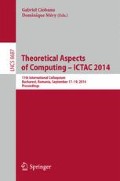Abstract
Computation can be considered by taking into account two dimensions: extensional versus intensional, and sequential versus concurrent. Traditionally sequential extensional computation can be captured by the λ-calculus. However, recent work shows that there are more expressive intensional calculi such as SF-calculus. Traditionally process calculi capture computation by encoding the λ-calculus, such as in the π-calculus. Following this increased expressiveness via intensionality, other recent work has shown that concurrent pattern calculus is more expressive than π-calculus. This paper formalises the relative expressiveness of all four of these calculi by placing them on a square whose edges are irreversible encodings. This square is representative of a more general result: that expressiveness increases with both intensionality and concurrency.
Access this chapter
Tax calculation will be finalised at checkout
Purchases are for personal use only
Preview
Unable to display preview. Download preview PDF.
References
Abadi, M., Gordon, A.: A calculus for cryptographic protocols: The spi calculus. Information and Computation 148(1), 1–70 (1999)
Abramsky, S.: The lazy lambda calculus. In: Research Topics in Functional Programming, pp. 65–116. Addison-Wesley (1990)
Barendregt, H.P.: The Lambda Calculus. Its Syntax and Semantics. Studies in Logic and the Foundations of Mathematics. Elsevier Science Publishers B.V. (1985)
Bengtson, J., Johansson, M., Parrow, J., Victor, B.: Psi-calculi: a framework for mobile processes with nominal data and logic. Logical Methods in Computer Science 7(1) (2011)
Berry, G., Boudol, G.: The chemical abstract machine. In: POPL 1990: Proceedings of the 17th ACM SIGPLAN-SIGACT Symposium on Principles of Programming Languages, pp. 81–94. ACM, New York (1990)
Busi, N., Gorrieri, R., Zavattaro, G.: On the expressiveness of linda coordination primitives. Inf. Comput. 156(1-2), 90–121 (2000)
Cardelli, L., Gordon, A.D.: Mobile ambients. In: Nivat, M. (ed.) FOSSACS 1998. LNCS, vol. 1378, pp. 140–155. Springer, Heidelberg (1998)
Curry, H.B., Feys, R.: Combinatory Logic, vol. I. North-Holland, Amsterdam (1958)
De Nicola, R., Gorla, D., Pugliese, R.: On the expressive power of klaim-based calculi. Theor. Comput. Sci. 356(3), 387–421 (2006)
Felleisen, M.: On the expressive power of programming languages. Science of Computer Programming 17(1-3), 35–75 (1991)
Given-Wilson, T.: Concurrent Pattern Unification. PhD thesis, University of Technology, Sydney, Australia (2012)
Given-Wilson, T.: An Intensional Concurrent Faithful Encoding of Turing Machines. In: 7th Interaction and Concurrency Experience (ICE 2014), Berlin, Germany (June 2014)
Given-Wilson, T., Gorla, D.: Pattern matching and bisimulation. In: De Nicola, R., Julien, C. (eds.) COORDINATION 2013. LNCS, vol. 7890, pp. 60–74. Springer, Heidelberg (2013)
Given-Wilson, T., Gorla, D., Jay, B.: Concurrent pattern calculus. In: Calude, C.S., Sassone, V. (eds.) TCS 2010. IFIP AICT, vol. 323, pp. 244–258. Springer, Heidelberg (2010)
Given-Wilson, T., Gorla, D., Jay, B.: A Concurrent Pattern Calculus. To appear in: Logical Methods in Computer Science (2014)
Gorla, D.: Comparing communication primitives via their relative expressive power. Information and Computation 206(8), 931–952 (2008)
Gorla, D.: A taxonomy of process calculi for distribution and mobility. Distributed Computing 23(4), 273–299 (2010)
Gorla, D.: Towards a unified approach to encodability and separation results for process calculi. Information and Computation 208(9), 1031–1053 (2010)
Jay, B.: Pattern Calculus: Computing with Functions and Data Structures. Springer (2009)
Jay, B., Given-Wilson, T.: A combinatory account of internal structure. Journal of Symbolic Logic 76(3), 807–826 (2011)
Jay, B., Kesner, D.: First-class patterns. Journal of Functional Programming 19(2), 191–225 (2009)
Lanese, I., Pérez, J.A., Sangiorgi, D., Schmitt, A.: On the expressiveness of polyadic and synchronous communication in higher-order process calculi. In: Abramsky, S., Gavoille, C., Kirchner, C., Meyer auf der Heide, F., Spirakis, P.G. (eds.) ICALP 2010. LNCS, vol. 6199, pp. 442–453. Springer, Heidelberg (2010)
Lanese, I., Vaz, C., Ferreira, C.: On the expressive power of primitives for compensation handling. In: Gordon, A.D. (ed.) ESOP 2010. LNCS, vol. 6012, pp. 366–386. Springer, Heidelberg (2010)
Milner, R.: Functions as processes. In: Proceedings of the Seventeenth International Colloquium on Automata, Languages and Programming, pp. 167–180. Springer-Verlag New York, Inc., New York (1990)
Milner, R.: Communicating and Mobile Systems: the Pi-Calculus. Cambridge University Press (June 1999)
Milner, R., Parrow, J., Walker, D.: A calculus of mobile processes, part I/II. Information and Computation 100, 1–77 (1992)
Nielsen, L., Yoshida, N., Honda, K.: Multiparty symmetric sum types. In: EXPRESS, pp. 121–135 (2010)
Palamidessi, C.: Comparing the expressive power of the synchronous and the asynchronous pi-calculus. CoRR, cs.PL/9809008 (1998)
Parrow, J., Victor, B.: The fusion calculus: Expressiveness and symmetry in mobile processes. In: Proc. of LICS, pp. 176–185. IEEE Computer Society (1998)
Plotkin, G.: Full abstraction, totality and pcf. Math. Structures Comput. Sci. 9 (1997)
van Glabbeek, R.J.: Musings on encodings and expressiveness. In: Proc. of EXPRESS/SOS. EPTCS, vol. 89, pp. 81–98 (2012)
Author information
Authors and Affiliations
Editor information
Editors and Affiliations
Rights and permissions
Copyright information
© 2014 Springer International Publishing Switzerland
About this paper
Cite this paper
Given-Wilson, T. (2014). Expressiveness via Intensionality and Concurrency. In: Ciobanu, G., Méry, D. (eds) Theoretical Aspects of Computing – ICTAC 2014. ICTAC 2014. Lecture Notes in Computer Science, vol 8687. Springer, Cham. https://doi.org/10.1007/978-3-319-10882-7_13
Download citation
DOI: https://doi.org/10.1007/978-3-319-10882-7_13
Publisher Name: Springer, Cham
Print ISBN: 978-3-319-10881-0
Online ISBN: 978-3-319-10882-7
eBook Packages: Computer ScienceComputer Science (R0)

